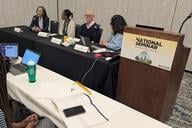You have /5 articles left.
Sign up for a free account or log in.
When Lora Park was a graduate student in psychology at the University of Michigan, she used to hang out with a group of women in the physical sciences. And Park noticed that some of these exceptionally bright, academically successful women would hide their accomplishments from men they would meet, afraid of scaring them off.
Watching these scenes, Park wondered if women fear that they can't excel in math and science fields and also experience love. Park is now an assistant professor of psychology at the State University of New York at Buffalo. The journal Personality and Social Psychology Bulletin is about to publish a series of research projects she led, along with Buffalo graduate students, that suggest that when college-age women think about romance, they become less interested in studying STEM fields. College-age men, however, can get interested in romance without any impact on their engagement with math and science.
Park acknowledged that the research will be controversial -- and that many times when she presents findings to women in academe, they don't like talking about the role that something such as romance may play in the choices students make about what to study. But Park said that focusing on these questions could help confront the gender gap in STEM fields, which persists even as women have demonstrated that they have the academic preparation and ability to succeed in them.
Two of the studies were based on groups of students in an introductory psychology course; some of the students (based on prior surveys) were interested in studying STEM fields, and some were not. Participants were shown images related to love (images of romantic restaurants, sunsets at the beach, etc.) or images that related to "intelligence goals" (images of libraries, books, eyeglasses). Women who were exposed to the romantic images (but not the men exposed to the same images) were subsequently found in surveys to have a less positive feeling about STEM fields and to indicate that they were less likely to major in them.
Since that study and a similar one were based on external stimuli (the images seen in one case), the Buffalo researchers also did polling based entirely on students' self-reported feelings and interests.
In this study, female undergraduates in a mathematics course were given a mobile device on which they could record their strivings and activities in various areas, including romance and academics. They might note a crush, or calling someone they liked (romantically) or various academic accomplishments (related to finishing assignments, doing well in class, etc.). Likewise they answered questions about their senses of how attractive they found themselves.
The results: when the women were focused on romance, they felt good about themselves, but were not invested in their math class. And whenever they considered themselves attractive or desirable, the next day they would be disengaged from the math courses.
So if bright, college-aged women can easily be discouraged from interest in STEM fields, what should be done? Park said that the first thing to do is to start talking about these issues, and to make clear that talking about them is not a matter of blaming women for their choices. "This is about the cumulative impact of romantic images and scripts for women's lives" that women are exposed to from very young ages, Park said.
Telling women "to be aware of these subtle influences" is important, Park said.
Asked if her research suggests the value of women's colleges in that most women may have fewer romantic prompts on a daily basis, Park said that she had no data on the topic. Even if that is the case, she said, students at women's colleges are hardly isolated from societal influences. But she said that to the extent women's colleges are known to stress the importance of female academic achievement, that would have a positive effect. Likewise, she said much of the problem is related to a sense in traditional society that science is somehow masculine, and that men may be put off by women becoming a force in STEM fields. This should not be a factor at women's colleges.
She has several current projects going on to study ways that colleges might use "counter-stereotypes" to encourage women to stay in science. For instance, she said that she is looking at whether presenting young women with images not only of female scientists but of attractive female scientists may help. (There are some similarities between Park's recommendations and those of scholars who recently found that women in science are more likely than are men in academic science to regret not having more children. The scholars said that young scientists need role models of women who do have children and successful careers and that colleges need to provide mentoring about these issues.)
Park said that the key is to let women "think about their future possible self" not in ways that are dictated by "the script" they have picked up over the years, but by their potential.
Another area of research she is pursuing may or may not be helpful to her efforts, Park said. Since the assumptions of many women appear to be that men find female STEM success unattractive, she hopes to find out whether this is in fact the case.




